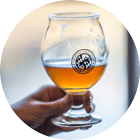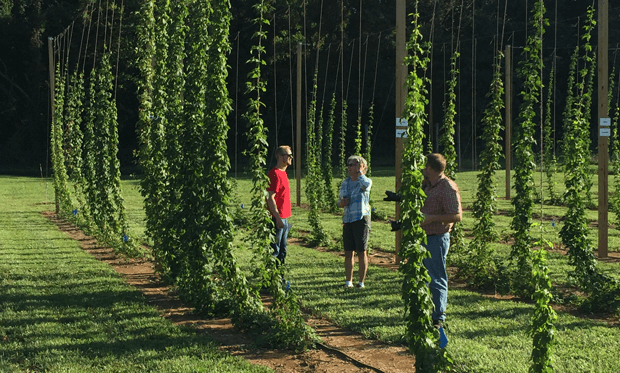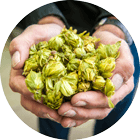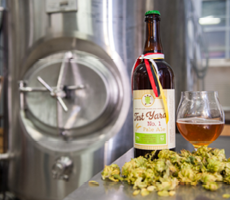- November 18, 2016
- By Chris Carroll
Ask Tom Barse ’77, owner of Milkhouse Brewery at Stillpoint Farm, what sets him apart as a brewer and he’ll tell you he makes “classic styles of beer improved with Maryland hops.”
With his latest beer creation, you can now make that “University of Maryland hops.”
The rich, copper-hued pale ale brewed at his Frederick County farm is flavored with several varieties of the green flowers—they’re what give beer its bitter taste and spicy smell—grown at the University of Maryland Extension’s Western Maryland Research and Education Center.

On Nov. 16, he poured samples of “Test Yard #1”—(his original idea, “Beer the Turtle,” was a little too close to university trademarks for comfort)—to extension personnel, the dean of the College of Agriculture and Natural Resources (AGNR), local and state politicians and officials from the state Department of Agriculture, among others.
He also topped off glasses with samples of several unnamed test beers made with still other varieties of hops from the Keedysville-based research center.
“They were all grown at the University of Maryland farm,” he told guests. “And they are all delicious.”
The hop-growing experiment began this spring, even though the man in charge, Bryan Butler ’84, the Carroll County extension agent, doubted that the crop could take root in Maryland’s climate and soil. Most American hops are grown in the semi-arid climate of eastern Washington state.
But an increasing number of Maryland brewers operate, like Barse, under a 2012 state law that allows farm breweries to sell beer directly to customers if they grow some of their own ingredients. They need the UMD Extension, which conducts research under the umbrella of the Maryland Agricultural Experiment Station, to provide the same guidance it does for typical Maryland crops like corn or soybeans, Butler says.

Visitors tour an experimental hop garden at the UMD Western Maryland Research and Education Center, source of the hops for Barse’s new beer.
“We are not in this to be brewers, but to provide all the things a land-grant institution can provide,” including help with pest management, guidance on matters like pruning and harvesting, and agronomics, he says.
Interest in locally produced beer has exploded nationwide, and the Brewers Association of Maryland counts more than 60 craft breweries as members.
Against that backdrop, helping small-scale brewers perfect their craft is something the University of Maryland will support fully, says AGNR Dean Craig Beyrouty.
“Anytime we can help the local economy in communities anywhere in the state through our extension and research—that’s our focus and that’s why we’re here,” he said. “A farm brewer could potentially spend a lot of time conducting experiments himself on different varieties of hops, but we can take on that function, while he focuses on making his business successful.”
Once the hop vines were established at the research center in Keedysville, Butler called on Barse for a knowledgeable critique of his efforts.

Barse is a longtime home brewer who has been growing and selling hops for nearly a decade at Stillpoint Farm, where he and his wife, Carolann McConaughy, also raise and shear rare sheep in addition to their beer-related work. The first commercial farm brewer in Maryland, he’s also the president of the Northeast Hop Growers Association.
“Tom took a look at it and said, “Oh my God, this is the best first-year hop garden I’ve ever seen,’” Butler says.
The next step, Butler says, is finding varieties of barley and rye—neither of which is a widely grown crop in Maryland—most suitable for beer production in the state.
“When we do this again next year, we’re going to have an all-Maryland beer, hopefully,” he announced to guests at Barse’s brewery.
For Barse, a former attorney and schoolteacher, adding beer production and sales to the mix at Stillpoint Farm has been the key to economic success.
“I can afford fertilizer. I can afford to lime my fields. It has improved our sheep operations,” he said. “It has made a true impact on our farm.”
